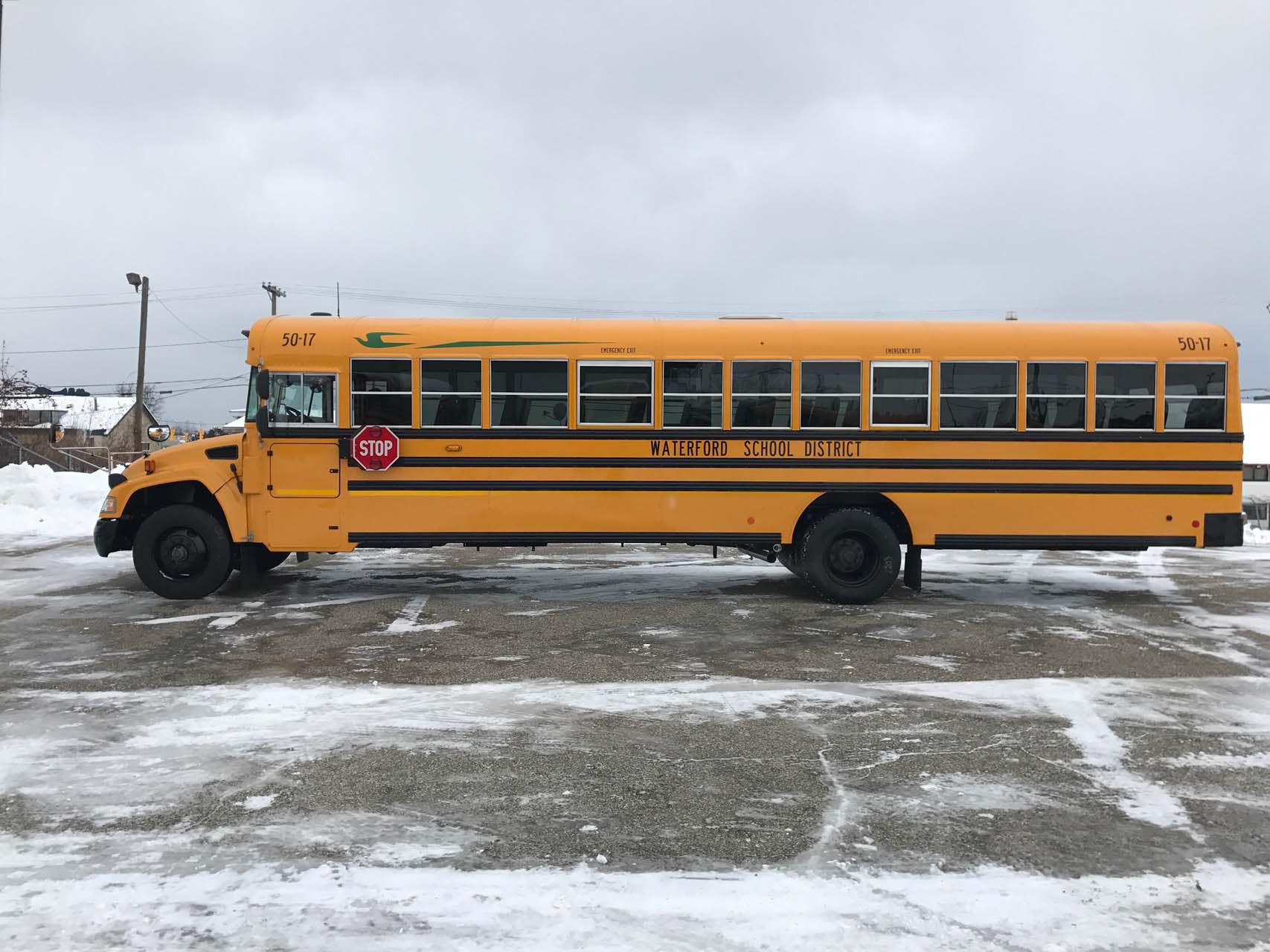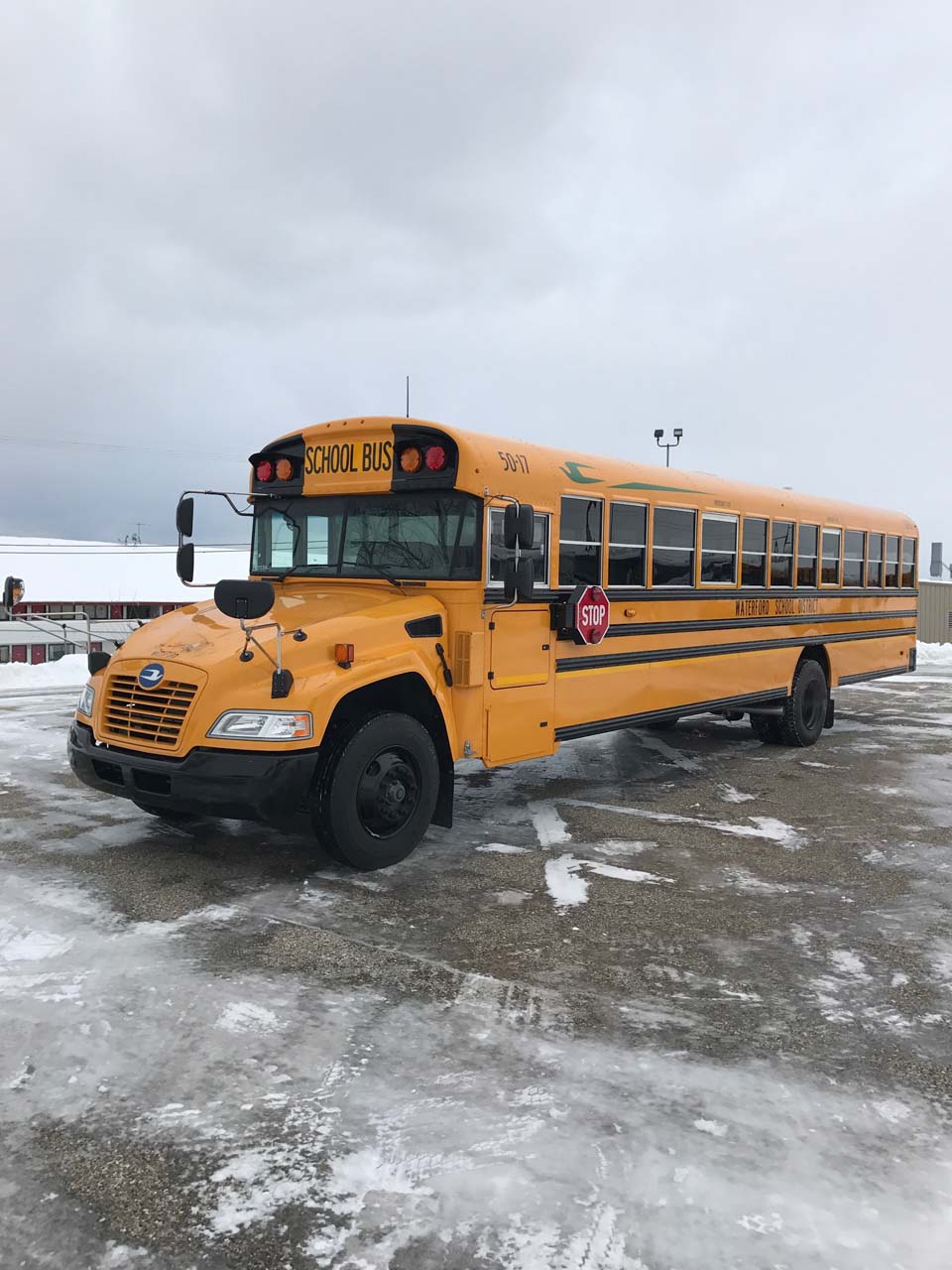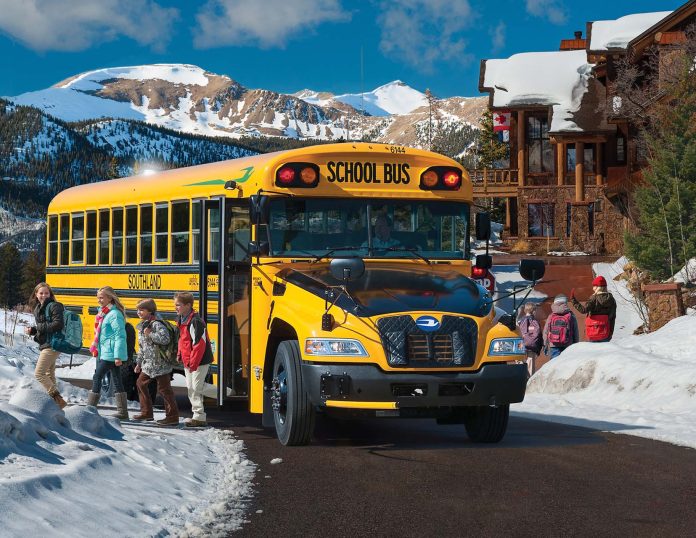With millions of Americans facing sub-zero temperatures this winter, school systems need reliable transportation that operates well in cold weather.
Cold Weather Performance
Cold weather should not be a constant barrier to getting children to and from school. Thankfully, the 1,000+ school districts operating propane school buses are consistently and seamlessly transporting 1.3 million students to school safely every day — even in the harshest of conditions.
Propane buses don’t care if it’s cold outside. In the Blue Bird Vision Propane school bus, propane remains in a liquid state until it reaches the cylinder. This cutting-edge technology alleviates cold-weather start issues associated with vapor technology propane systems of the past. In fact, the new fuel system provides for unaided cold weather start ups to minus 40 degrees Fahrenheit.
Transportation directors across the country and in Canada share that, in cold weather conditions, buses fueled by propane autogas start and operate better than their diesel and electric counterparts, where the fuel may gel or range may be compromised. Districts in the coldest parts of North America speak about how they are faring with propane school buses.
Ready to Go in a Few Minutes
Howard-Winneshiek Community School District in Cresco is located in northeast Iowa. The district’s school buses travel up to 15,000 miles each per school year on long rural routes. The weather can be extreme, with cold-weather months of negative 30 degree temperatures and abundant snowfall. The district’s fleet consists of nine propane buses and 23 diesel models.
“Our propane buses perform flawlessly,” said Brian Swestka, director of transportation. “They warm up substantially quicker than our diesel buses. The propane buses are ready to go in just a few minutes compared with 20-30 minutes for diesel to warm up.”
For the school district’s diesel buses to operate during the winter months, the maintenance crew plugs the engine block heater to an electrical outlet at night, costing both time and money. This is not needed for the propane buses.
“Every time we do any type of service, it costs us money. Propane buses require less maintenance than our diesel buses, and that means lower costs,” added Swestka, who said the school district’s yearlong data showed the average cost per mile for its propane buses to be about 60 percent lower than its diesel buses.
Cost savings benefit the school district, but the biggest difference for the drivers and the passengers has been the warmer and quieter performance of the propane buses. On very cold days, the school district’s diesel buses often don’t get warm enough to get to a comfortable temperature inside the bus, which is not the case with the propane models. Also, the school district’s drivers can hear traffic around the propane buses better and hear the students inside the bus with more clarity.

“Performs Consistently Great”
Brandon School Division in Manitoba, Canada, covers a landscape containing both urban and rural areas. Temperatures average in the mid-80s in the warmer months, and down to negative 35 degrees Fahrenheit in the colder months, with wind chills as low as negative 60. Average yearly snowfall is 40 inches. Its school bus fleet is made up of 12 propane buses and 31 diesel buses.
The propane buses have performed consistently for the school district. “We get temperatures from extreme cold to quite hot, and there is no change in how the propane bus performs, which is consistently great,” said Ron Harkness, supervisor of transportation.
Prior to purchasing its first propane bus, the school district tested a demo propane bus for its cold-weather performance. It found that the demo bus did not need to be plugged into block heaters and that they started right up. The diesel models are always kept plugged.
The drivers are equally impressed with the propane buses. “The propane buses heat up quickly, which our drivers appreciate,” said Harkness. “The student and driver comfort is fantastic. Students even need to tell the drivers to turn the heat down — that never happens with the diesel buses.”

Start Up and Stay Warm Inside
Proctor Public Schools in Proctor, Minnesota, operates a fleet of 30 school buses with nine Blue Bird Vision Propane buses. The buses travel rural and mountainous terrain. Nearly three-quarters of the area is serviced by gravel roads and the elevation significantly changes throughout the district. During the summer, temperatures reach into the 90s, with temps dipping to as low as negative 30 degrees during the winter with negative 50-degree wind chill. Average snowfall is 75 inches annually.
Transportation Supervisor Curt Benassi has found that his propane school buses are outperforming their diesel buses in these conditions. “When it’s cold out, our diesel buses take forever to warm up and we need to check them to see if they work,” Benassi said. “Even when it’s 40 below, our propane buses start up with no trouble and no additional time needed.”
Benassi says that on cold days lower than 20 degrees, his maintenance crew must dump fuel conditioner into the diesel fuel to avoid it from being turned into a wax. Each bottle of condition fuel is $9 per bus per time. Sometimes in the district’s diesel buses, a block heater doesn’t work to warm up the antifreeze, and they can’t use the bus. He often has diesel buses that don’t start up due to cold weather. In comparison, Proctor Public Schools’ propane buses do not need fuel conditioner or electric block heaters to start.
The school district’s school bus drivers and students also benefit from the ability of the propane buses to start up and stay warm inside the cabin. “Our drivers love how warm the propane buses get,” said Benassi. “From front to back, the temperature remains at a consistent 70 degrees. Students sometimes tell the driver to turn the heat down, which never happens in diesel. Compare that to the front of the diesel bus that might be only 30 degrees — throughout the entire bus route. Drivers often cover themselves with blankets in diesel buses, and, on extremely cold days, almost all of the floor is covered with frost during the route.”
During cold-weather months, propane school buses across North America are proving to perform consistently and economically at temperatures well below zero, satisfying drivers, students, technicians, parents and district leadership.
 Todd Mouw is executive vice president of ROUSH CleanTech, an industry leader of advanced clean vehicle technology. Mouw has more than two decades of experience in the automotive and high-tech industries. As former president of the NTEA Green Truck Association, Mouw helped set standards in the green trucking industry.
Todd Mouw is executive vice president of ROUSH CleanTech, an industry leader of advanced clean vehicle technology. Mouw has more than two decades of experience in the automotive and high-tech industries. As former president of the NTEA Green Truck Association, Mouw helped set standards in the green trucking industry.
To learn more, visit ROUSHcleantech.com.
The views expressed are those of the content sponsor.


















